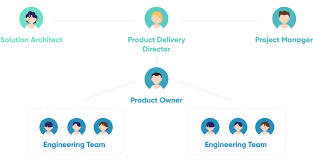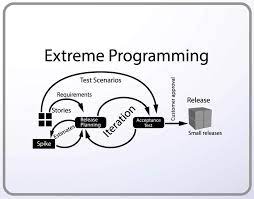Software development is a complex process that requires the expertise of a skilled team of professionals. The success of any software project depends largely on the capabilities and experience of the development team. In this article, we will explore the importance of a software development team, their roles and responsibilities, and how they work together to deliver high-quality software products.
The Importance of a Software Development Team
A software development team is responsible for designing, developing, testing and maintaining software applications. They are responsible for ensuring that the final product meets all requirements and specifications while also adhering to industry standards. A skilled software development team can help to reduce development time, minimize errors, and improve the overall quality of the product.
Roles and Responsibilities
A typical software development team consists of several members with varying roles and responsibilities. The team may include project managers, developers, testers, designers, and technical writers. Each member has a specific role to play in ensuring that the project is completed successfully.
Project Managers: Project managers are responsible for overseeing the entire project from start to finish. They ensure that all tasks are completed on time and within budget.
Developers: Developers are responsible for writing code that meets all requirements and specifications. They use programming languages such as Java or Python to write code that is efficient, scalable, and easy to maintain.
Testers: Testers are responsible for ensuring that the software product works as expected. They perform various tests such as unit testing and integration testing to identify any defects or issues with the application.
Designers: Designers are responsible for creating user interfaces that are visually appealing and easy to use. They work closely with developers to ensure that the design is implemented correctly.
Technical Writers: Technical writers are responsible for creating documentation such as user manuals or technical specifications. They ensure that all documentation is accurate and up-to-date.
Working Together
A successful software development team must work together effectively to deliver high-quality products on time. Communication is key to ensuring that all team members are aware of their roles and responsibilities and are working towards a common goal. Regular meetings and updates can help to keep everyone on track and ensure that the project is progressing as planned.
Conclusion
In conclusion, a software development team is essential for the success of any software project. They play a critical role in designing, developing, testing, and maintaining software applications. A skilled team can help to reduce development time, minimize errors, and improve the overall quality of the product. Effective communication and collaboration are key to ensuring that the team works together effectively to deliver high-quality products on time.
7 Tips for Building a Successful Software Development Team
- Foster a culture of collaboration and communication
- Set clear objectives and expectations
- Utilize the right tools for the job
- Celebrate wins together
- Establish trust among team members
- Promote continuous learning opportunities
- Practice agile development principles
Foster a culture of collaboration and communication
In today’s fast-paced software development industry, fostering a culture of collaboration and communication is essential for success. A strong team dynamic can help to improve productivity, reduce errors, and ensure that projects are completed on time and within budget.
Collaboration involves working together towards a common goal. In a software development team, this means that all members must work together to achieve the project’s objectives. This includes sharing ideas, knowledge, and expertise to ensure that the final product meets all requirements and specifications.
Communication is also critical in software development. Team members must communicate effectively to ensure that everyone is aware of their roles and responsibilities. This includes regular updates on project progress, identifying any issues or challenges, and discussing potential solutions.
To foster a culture of collaboration and communication within your software development team, it’s important to encourage open communication channels. This can include regular team meetings, daily stand-ups, or using collaboration tools such as Slack or Trello.
It’s also essential to create an environment where all team members feel comfortable sharing their ideas and opinions. Encouraging feedback and constructive criticism can help to improve the quality of the final product while also promoting personal growth and development.
In conclusion, fostering a culture of collaboration and communication is crucial for any successful software development team. By working together towards a common goal while communicating effectively throughout the process, teams can produce high-quality products efficiently while promoting personal growth and professional development among its members.
Set clear objectives and expectations
One of the most important tips for a successful software development team is to set clear objectives and expectations. When everyone on the team is working towards a common goal, it becomes easier to prioritize tasks, allocate resources, and manage timelines.
Clear objectives help the team to understand what is expected of them and what they need to accomplish. This can include specific goals such as completing a certain number of features or modules within a given timeframe. Objectives can also be more general, such as improving the overall quality of the software product or enhancing user experience.
Expectations are equally important as they help to define how the team should work together. This includes establishing guidelines for communication, collaboration, and accountability. For example, expectations may include regular status updates, daily stand-up meetings, or weekly progress reports.
Setting clear objectives and expectations can also help to identify potential roadblocks early on in the development process. This allows the team to take corrective action before issues become critical and impact project timelines or quality.
In conclusion, setting clear objectives and expectations is essential for a successful software development team. It helps everyone on the team understand what is expected of them and how they should work together to achieve their goals. By doing so, teams can improve collaboration, reduce errors, and deliver high-quality software products on time.
Utilize the right tools for the job
In the world of software development, utilizing the right tools for the job is essential to success. With so many different tools available, it can be overwhelming to choose the right ones for your team. However, choosing the right tools can help to streamline your workflow, increase productivity, and ultimately lead to a better end product.
One of the most important things to consider when choosing tools is compatibility. You want to make sure that all members of your team are able to use the tools effectively and efficiently. This means taking into account factors such as operating system compatibility and skill level.
Another important consideration is functionality. You want to choose tools that are specifically designed for the task at hand. For example, if you need a tool for project management, you would want to choose a tool that is specifically designed for that purpose.
In addition to functionality, ease of use is also an important factor. The easier a tool is to use, the more likely your team members will be able to utilize it effectively. This means taking into account factors such as user interface design and accessibility.
Lastly, cost is also an important factor when choosing tools. While some tools may be expensive upfront, they may save you time and money in the long run by increasing productivity and efficiency.
In conclusion, utilizing the right tools for the job is essential in software development. Taking into account factors such as compatibility, functionality, ease of use, and cost can help you choose tools that will streamline your workflow and ultimately lead to a better end product.
Celebrate wins together
Celebrating wins together is an essential tip for any software development team. It’s easy to get caught up in the day-to-day tasks and forget to celebrate the successes along the way. However, taking time to acknowledge and celebrate wins can have a significant impact on team morale, motivation, and productivity.
When a team successfully completes a project or achieves a significant milestone, it’s important to take time to recognize and celebrate that achievement. Celebrations can be as simple as ordering pizza for the team or taking them out for drinks after work. The key is to make sure that everyone feels appreciated and recognized for their hard work.
Celebrating wins together can also help to build a sense of camaraderie and teamwork within the group. When team members feel like they are part of something bigger than themselves, they are more likely to work together towards a common goal. This, in turn, can lead to increased productivity and better results.
In addition to celebrating big wins, it’s also important to acknowledge small victories along the way. Recognizing progress towards goals or milestones can help keep the team motivated and focused on achieving success.
In conclusion, celebrating wins together is an essential tip for any software development team. Taking time to recognize achievements and milestones can have a significant impact on team morale, motivation, and productivity. By building a sense of camaraderie and teamwork within the group, teams can achieve greater success than they ever could alone.
Establish trust among team members
Establishing trust among team members is one of the most important tips for a successful software development team. Trust is the foundation of any successful relationship and it is especially important in a team environment where collaboration and communication are key.
When team members trust each other, they are more likely to communicate openly and honestly, share their ideas and opinions, and work together towards a common goal. This can lead to increased productivity, better problem-solving skills, and improved morale.
So how can you establish trust among team members? Here are a few tips:
- Encourage open communication: Encourage team members to communicate openly and honestly with each other. Create an environment where everyone feels comfortable sharing their ideas and opinions without fear of judgment or criticism.
- Lead by example: As a leader or manager, lead by example by being transparent, honest, and trustworthy yourself. This will set the tone for the rest of the team.
- Build relationships: Encourage team members to get to know each other on a personal level. This can help to build stronger relationships based on mutual respect and understanding.
- Celebrate successes: Celebrate successes as a team and recognize individual contributions. This can help to build morale and create a sense of camaraderie among team members.
In conclusion, establishing trust among team members is essential for a successful software development team. By encouraging open communication, leading by example, building relationships, and celebrating successes together, you can create an environment where everyone feels valued and respected. When trust is established among team members, they are more likely to work together effectively towards achieving their goals.
Promote continuous learning opportunities
In today’s fast-paced world of software development, it is essential for development teams to stay up-to-date with the latest technologies and trends. One of the best ways to achieve this is by promoting continuous learning opportunities within the team.
Continuous learning opportunities can take many forms, from attending industry conferences and workshops to online training courses and webinars. By providing these opportunities, you are not only investing in your team’s professional development but also ensuring that they are equipped with the necessary skills to tackle any challenges that may arise.
Promoting continuous learning also helps to foster a culture of innovation within the team. When team members are constantly learning and exploring new ideas, they are more likely to come up with creative solutions to problems and think outside the box.
In addition, promoting continuous learning can also help with employee retention. When employees feel that their employer is invested in their professional development, they are more likely to stay loyal and committed to the company.
So if you want your software development team to be at the forefront of innovation and equipped with the latest skills and knowledge, make sure you promote continuous learning opportunities within your organization.
Practice agile development principles
Agile development is a software development methodology that emphasizes flexibility, collaboration, and rapid iteration. The agile approach is based on the idea of breaking down a project into smaller, more manageable tasks that can be completed quickly and efficiently.
One of the most important tips for any software development team is to practice agile development principles. By adopting an agile approach, teams can work more collaboratively and respond quickly to changes in requirements or priorities.
The key principles of agile development include:
- Iterative Development: Agile teams work in short cycles, typically two to four weeks, to deliver working software incrementally. This allows for frequent feedback from stakeholders and enables the team to make adjustments as needed.
- Continuous Feedback: Agile teams prioritize regular communication with stakeholders to ensure that they are aligned on project goals and requirements. This feedback loop helps teams stay on track and ensures that everyone is working towards the same end goal.
- Collaboration: Agile teams emphasize collaboration between team members, stakeholders, and customers. This helps to ensure that everyone is working towards the same goal and encourages open communication between all parties involved in the project.
- Flexibility: Agile teams are flexible in their approach and are willing to adapt to changing requirements or priorities as needed. This allows them to respond quickly to new information or changes in the business environment.
By practicing these principles, software development teams can work more efficiently and effectively towards delivering high-quality software products. The agile approach helps teams stay focused on delivering value while also enabling them to respond quickly to changes or new information as it arises.
In conclusion, practicing agile development principles is a crucial tip for any software development team looking to improve their processes and deliver better results. By focusing on iterative development, continuous feedback, collaboration, and flexibility, teams can work together more effectively towards delivering high-quality software products that meet stakeholder needs and expectations.



